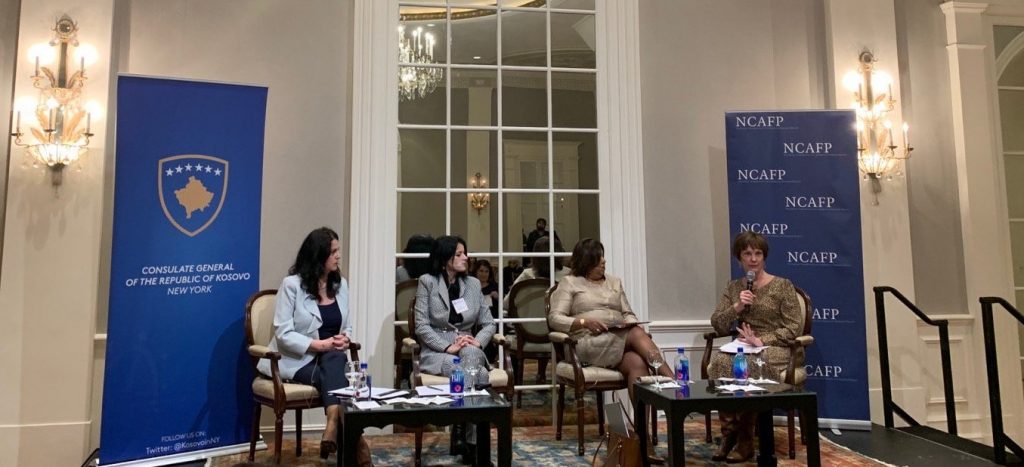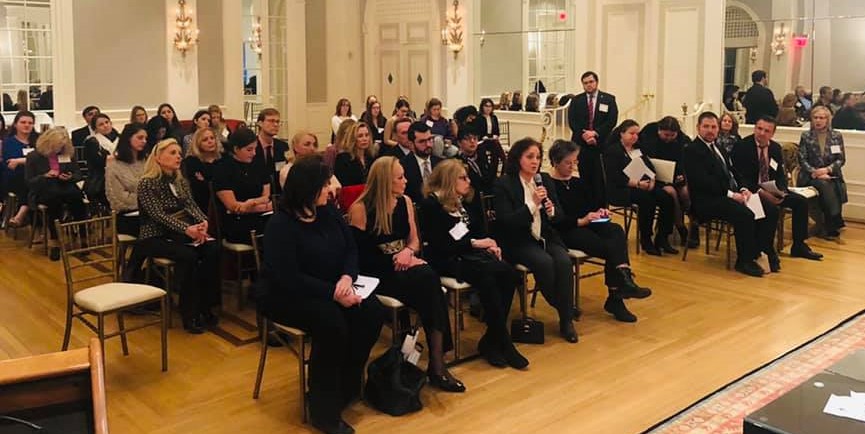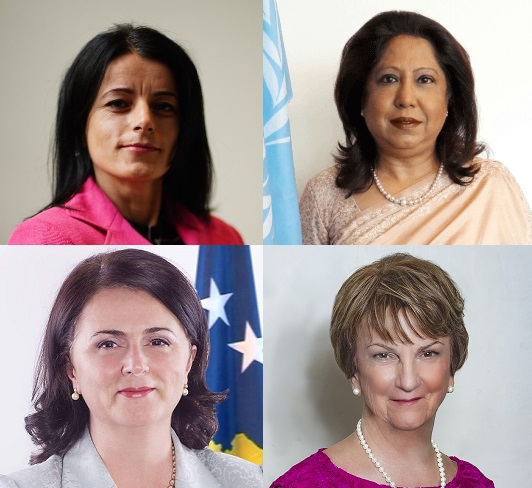‘Silent No More’ – Ambassador Teuta Sahatqija Speech at the Event


National Committee on American Foreign Policy in partnership with Kosovo Consulate General New York hosted a discussion on Perspectives on Combating Sexual Violence in Conflict. The Tuesday event was moderated by Susan Elliot, President and CEO of National Committee on American Foreign Policy and featured Ms. Vasfije Krasniqi-Goodman, Her Excellency Ms. Pramila Patten, UN Special Representative of Combating Sexual Violence in Conflict, Ambassador Teuta Sahatqija, Consul General of the Republic of Kosovo, New York.
Silence no more, Combating sexual violence in conflict
Sexual Violence as the tool of war

Sexual violence regardless the cause comprise the crime against the individual. But if the rape in war is used as the pre calculated, premediated action of the state structures with the chain of command against ethnic or religious group, than it does not hurt solely the individual who experience the rape, but it becomes the weapon that aims the disintegration of the patriarchal families and the fabric of the society they live in, bringing all together the long lasting devastating impact to population.
War in Kosova 1998-1999 and statistics
During the 1998-1999 war in Kosovo, an estimated 20,000 women and men were sexually abused by Serbian military and paramilitary forces[1].
The massive rape of uniformed individuals against, mostly, but not solely women and girls in Kosova, in many cases happened in front of the family members. Torturing and killings of children of young age to old women, went hand by hand with massive killing, burning of houses and entire villages, ending with expulsion of the rest of population. All together completing the picture of ethnic cleansing seen in Croatia, Bosnia and Kosovo at the end of 20th century.
This targeted organized rape as the horrible war weapon that turns women’s body to the battlefield, is finally treated by UN as the war crime, identifying rapists as war criminals.
While most war rapists still run free, thousands of victims had to live for many years in isolation- imprisoned by shame, stigma, discrimination and fear. They still struggle with social ostracism, emotional torment, psychological damage, physical injuries and- in many cases- disease.
Unfortunately sexual abuse during the war as case, is almost not present at the persecution of war criminals.
In Kosovo only three prosecutions on allegations of war crimes of sexual violence in Kosovo have been completed, releasing the perpetrators[2] for lack of facts and continuing the impunity of the criminals and their commanders. Thus, there has not been any single conviction for war rape in Kosovo! The same goes to Serbia which didn’t persecute or convict any war criminal for sexual abuse, despite having complete documentation of these cases gathered from UNMIK and EULEX, delivered to Serbia’s judiciary.
The actions to reintegrate survivors and combat sexual violence during conflict happening again
For ages war rape existed surrounded by silence, negligence, and the lack of willingness to deal with it. Stigma in Patriarchal societies acted against the victims instead of embracing them and fighting against the perpetrators
The War rape cannot stop by neglecting it, acting as it doesn’t exist.
The war rape will stop by fighting stigma, preparing societies for accepting them and reintegrating to the society, helping in economic empowerment of the survivors, stepping ahead of the survivors, fighting for justice to prevent future incidents. Success in each country contributes to success in other countries too.
Talking for war rape and survivors in Kosovo was not an easy task either. I remember that even mentioning war rape in Parliament of Kosova caused strong reactions and denial not only from men parliamentarians, from women too.
It needed persistent efforts of women Parliamentarians, women Civil Society, President Jahjaga, President Thaqi, religious leaders and media to change the perception and turn this taboo issue to public issue that need willingness to deal with.
Today Kosovo can introduce the best practices to the world. I will mention some.
–Installation “Thinking of You” by artist Alketa Xhafa and producer Anna di Lellio, made under the patronage of President Jahjaga was presented in 2014. The installation was set in the football stadium in Prishtina. 5000 dresses were hanged in the stadium, filling it completely, showing the volume of the crime committed against innocent people. Those dresses were collected all over Kosovo and abroad and each and every one of them personalized a body and an empty soul that cannot talk but keep the horrible secret inside, screaming in silence. The installation and all supporting events and media coverage definitely broke the silence on sexual violence during the war in Kosova.
Women Parliamentarians Cross Party Caucus supported the proposal of MP Alma Lama to vote and fund the Monument for women and their sufferings in the war in Kosovo. Monument is a typographic sculpture that has a face of the woman and it consist of 20,000 medallions each with the distinctive portrait, representing women during the war. Monument was unveiled on the liberation day on 12 June 2015 and is situated in the center of Prishtina.
The marching in the center of Prishtina to support the survivors of sexual violence during the war in Kosovo
June 2018 the march for the support of the survivors of the sexual violence during the war gathered highest government officials, Ambassadors, NGOs, Parliamentarians, artists, citizens male and female. President Hashim Thaqi, Former President Atifete Jahjaga, The Head of EU Mission, gave the speech to support and encourage women and men, survivors of sexual violence to stand up. Each speech started with the reading of testimonial of a survivor.
Testimonials
In October 2018, the survivor Vasfije Krasniqi, spoke openly at the interview in RTK, Kosovo public television about her experience. In spring of 1998 she was 16 years old. She was taken from her family home and raped by a Serbian policemen and another civilian. Broken after barbaric act, she begged them to kill her. The answer of the rapists was that they will leave her alive to let her suffer all her life.
Vasfije didn’t choose to pursue the role of victim, rather she addressed it to UNMIK after the end of the war to seek the justice. Three trials that took place ended without the charges toward the rapist. They still live in Kosovo unpunished.
Her interview and the courage to speak openly, refusing the role of the victim and embracing the role of the fighter for justice, moved deeply everyone, portraying her courage as the heroic act.
President Thaqi gave her the Presidential Medal for courage
Vasfije gave the voice and the courage to every survivor. After her sexual violence was not any more the taboo issue in Kosovo.
The support and the steps toward recognition of sexual violence during the war
NGO as Medica Kosova in Gjakova and other worked immediately after the war with the survivors, providing them with gynecological and psychosocial services. Later they enriched their services with providing the survivors trainings and possibilities for economic revival. Some of projects were as providing the survivors with bee-hives, cows, helping them to establish small farms and giving training. They tried also to help those women by building the small factory for producing the cheese and yogurt, but due to the insufficient funds, this project stopped.
March 9th, 2012 Recommendations by Women Parliamentarians Cross Party Caucus were voted in Parliament, obliging Parliament for special treatment of women sexually abused during the war. The recommendations also urges domestic and international justice to deal with the perpetrators treating this kind of crime as the genocidal crime.
In 2014, the Law 04/L-054 on the rights and the status of the Martyrs, invalids, Veterans, was amended to 04/L-172 the Law on the rights and the status of the Martyrs, invalids, Veterans, Victims of the Sexual violence, civilian victims and their families recognizing the category of sexual violence during the war survivors. This new law made a significant success for this category of citizens of Kosova.
In 2014, President Jahjaga established the National Council for the survivors of Sexual Violence, giving the survivors the voice and visibility as the existing part of the society, but also institutional response.
2017 Government established the verification commission was formed and the budget for pensions was dedicated. The time line of 5 years was offered for application through 4 NGO that worked during all the time with the survivors.
In December of 2017, the budget of € 1 Million was dedicated for the compensation of survivors of sexual violence during the war in Kosovo for the year 2018, continuing with the amount of annual € 800,000.00 for 2019, and 2020.
The verification Commission approved the status of the survivors to 900 persons, mostly women, but also men gained the status of the survivor and the rights for the benefits.
Justice
Unfortunately, although 20 years passed from the war, non of rapist was persecuted or arrested, leaving them free of charges and letting them live normal life.
“Failed by UNMIK, failed by EULEX, it is not surprising that few survivors have any faith in Kosovo’s own justice system,” the Amnesty International report says.
Economic empowerment
The most important support for women survivors is to provide them with ability to be economically independent. Economic independence will give them social strength and possibility to seek for justice and speak freely.
Kosovo women NGOs are working through different programs to offer the survivors possibilities to economic empowerment as the tool for their social and individual empowerment.
Having all this in mind, Kosova is the good example of fighting stigma, of the joint work of different parts of the society to achieve success in recognition and support of sexual violence.
Teuta Sahatqija
New York Jan 28,2020
[1] Michelle Hynes and Barbara Lopes Cardozo estimated that between 23,200 and 45,600 Kosovar Albanian women were raped between August 1998 and August 1999 (“Sexual Violence Against Women in Refugee Settings,” Journal of Women’s Health and Gender-based Medicine, 9, no. 8 (2000): pp. 819-824, cited by WWC et al., p. 12. Corrin cited estimates ranging from ten to thirty thousand war-related sexual assaults (“Post-Conflict Situation in Kosovo,” p. 93). CPWC estimated that “at least 20,000 women and girls were raped” during the war (Annual 2003, p. 136). CPWC used estimates made by Physicians for Human Rights that one percent of unprotected intercourse results in pregnancy for its estimate. CPWC assisted 1,960 war rape survivors (pp. 120-137).
[2] Amnesty International (2017). “WOUNDS THAT BURN OUR SOULS” COMPENSATION FOR KOSOVO’S WARTIME RAPE SURVIVORS, BUT STILL NO JUSTICE.
[online]
London: Amnesty international, p.7. Available at: https://www.amnesty.org/download/Documents/EUR7075582017ENGLISH.PDF